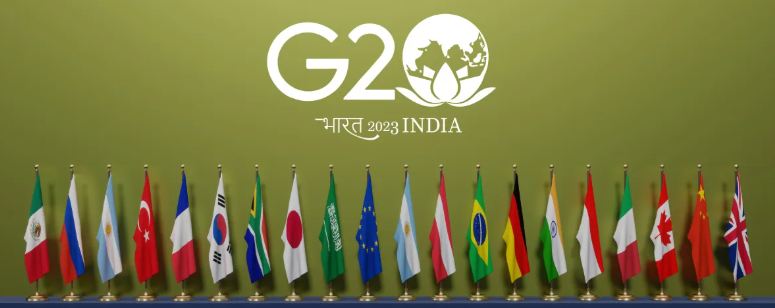The Group of Twenty (G20) is a premier intergovernmental forum established in 1999 to address global economic and financial stability. Initially a meeting for Finance Ministers and Central Bank Governors, it was elevated to the level of Heads of State and Government in 2008. The G20 plays a crucial role in shaping the global economic agenda and fostering cooperation on major international economic issues and has since expanded to include discussions on trade, climate change, sustainable development, health, agriculture, energy, environment, and anti-corruption.
Members:
The G20 comprises 19 countries and two regional bodies:
- Argentina
- Australia
- Brazil
- Canada
- China
- France
- Germany
- India
- Indonesia
- Italy
- Japan
- Republic of Korea
- Mexico
- Russia
- Saudi Arabia
- South Africa
- United Kingdom
- United States
- European Union
- African Union (since 2023)
- Turkiye
These members represent around 85% of the global GDP, over 75% of global trade, and approximately two-thirds of the world’s population. Spain is a permanent guest invitee.
How it Works:
- Presidency: The G20 agenda is steered by a rotating presidency, which lasts for one year and hosts the annual Summit. South Africa holds the presidency for 2025.
- Tracks: The G20 operates through two parallel tracks:
- Finance Track: Led by Finance Ministers and Central Bank Governors, focusing on financial and economic issues.
- Sherpa Track: Led by Sherpas (personal envoys of the leaders), coordinating the agenda and substantive work.
- Working Groups: Within these tracks, various thematic working groups address specific global priority areas. In 2023, these included green development, climate finance, inclusive growth, digital economy, public infrastructure, technology transformation, and women’s empowerment.2
- Engagement Groups: These groups bring together civil society, parliamentarians, think tanks, women, youth, labor, businesses, and researchers from G20 countries to contribute to the discussions.
- Troika: The presidency is supported by the Troika, consisting of the previous, current, and incoming presidencies.
Key Goals and Focus Areas:
The G20’s primary goal is to promote international economic cooperation and address global challenges. Key focus areas include:
- Economic and Financial Stability: Coordinating macroeconomic policies, promoting financial regulation, and addressing global economic risks.
- Sustainable Development: Working towards the Sustainable Development Goals (SDGs), focusing on inclusive and resilient growth.
- Climate Change: Discussing climate finance, green development, and just energy transitions. India’s 2023 presidency emphasized the Lifestyle for Environment (LiFE) movement.
- Digital Economy and Technological Transformation: Promoting digital public infrastructure and tech-enabled development.
- Global Health: Addressing global health architecture and pandemic preparedness.
- Trade and Investment: Supporting small and medium-sized enterprises in global trade and promoting fair labor practices.
- Reforming Multilateral Institutions: Aiming for a more accountable, inclusive, and representative international system.
- Women-led Development: Emphasizing women’s empowerment and representation for socio-economic progress.
Recent Summit Topics:
The agenda of G20 summits evolves based on current global challenges. Recent summits have focused on:
- The global health crisis and macroeconomic development.
- Environmental and climate challenges.
- Sustainable development at a global scale.
- Social inclusion, global governance reform, and energy transitions (Brazil’s 2024 priorities).
- Addressing the impact of the COVID-19 pandemic and restoring growth.
- Food security and agriculture.
The G20 continues to be a vital forum for international cooperation, addressing complex global issues and striving for a stable and sustainable future.
The G20 summits have been held in various locations across the globe, hosted by the country holding the rotating presidency each year. Here’s a list of past and future summit locations:
Past Summits:
- 2008: Washington D.C., United States
- 2009: London, United Kingdom (April); Pittsburgh, United States (September)
- 2010: Toronto, Canada (June); Seoul, South Korea (November)
- 2011: Cannes, France
- 2012: Los Cabos, Mexico
- 2013: Saint Petersburg, Russia
- 2014: Brisbane, Australia
- 2015: Antalya, Turkey
- 2016: Hangzhou, China
- 2017: Hamburg, Germany
- 2018: Buenos Aires, Argentina
- 2019: Osaka, Japan
- 2020: Riyadh, Saudi Arabia (virtual due to COVID-19)
- 2021: Rome, Italy
- 2022: Bali, Indonesia
- 2023: New Delhi, India
- 2024: Rio de Janeiro, Brazil
Upcoming Summit:
- 2025: Johannesburg, South Africa (November 22-23, 2025)
It’s important to note that in addition to the main annual summit, numerous ministerial meetings, working group meetings, and engagement group events are held throughout the year in various cities within the country holding the presidency. For example, during India’s presidency in 2023, over 200 events were held across different cities in the country.
The G20 presidency rotates annually among its members, selected from different regional groupings. This ensures that the summit is held in diverse locations across the member countries over time.


The G20 has undoubtedly become a cornerstone of global economic governance, but I wonder how effective it truly is in addressing the most pressing issues like climate change and inequality. While the forum brings together major economies, the lack of binding agreements often leaves its resolutions as mere recommendations. The rotating presidency is a great idea, but does it lead to a lack of continuity in addressing long-term challenges? I’m curious to know how the G20 ensures that smaller or less influential member countries have an equal voice in decision-making. Also, with so many focus areas, is there a risk of spreading efforts too thin rather than achieving tangible results in specific areas? What do you think could be done to make the G20 more impactful in driving real change?